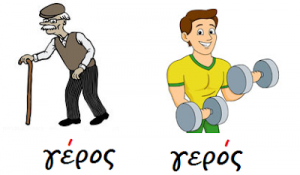Difference between revisions of "Language/Modern-greek-1453/Grammar/Paronyms-and-Homonyms"
| Line 4: | Line 4: | ||
! | ! | ||
English | English | ||
! | ! | ||
Ελληνικά | Ελληνικά | ||
| Line 19: | Line 17: | ||
* Etymology | * Etymology | ||
From the Greek, "beside" + "name | From the Greek, "beside" + "name | ||
|'''Παρώνυμη''' είναι μια λέξη που μοιάζει με μια άλλη. Μερικές φορές υπάρχει μόνο ένα γράμμα ή μια συλλαβή που αλλάζει. | |'''Παρώνυμη''' είναι μια λέξη που μοιάζει με μια άλλη. Μερικές φορές υπάρχει μόνο ένα γράμμα ή μια συλλαβή που αλλάζει. | ||
Όταν ακούμε τις δύο λέξεις, μπορούμε εύκολα να τις συγχύσουμε αν δεν είμαστε προσεκτικοί. | Όταν ακούμε τις δύο λέξεις, μπορούμε εύκολα να τις συγχύσουμε αν δεν είμαστε προσεκτικοί. | ||
| Line 34: | Line 24: | ||
|'''Homonyms''' : | |'''Homonyms''' : | ||
are two or more words that have the same sound or spelling but differ in meaning | are two or more words that have the same sound or spelling but differ in meaning | ||
|'''Ομώνυμες''' είναι οι λέξεις που ακούγονται ίδιες αλλά διαφέρουν στην ορθογραφία και στη σημασία. | |'''Ομώνυμες''' είναι οι λέξεις που ακούγονται ίδιες αλλά διαφέρουν στην ορθογραφία και στη σημασία. | ||
|- | |- | ||
| | | | ||
* Pay special attention to the spelling! | * Pay special attention to the spelling! | ||
| | | | ||
* Προσοχή στην ορθογραφία! | * Προσοχή στην ορθογραφία! | ||
| Line 104: | Line 89: | ||
'''14.''' ψιλός : high / grand | '''14.''' ψιλός : high / grand | ||
|} | |} | ||
== '''Examples of paronyms Greek''' == | == '''Examples of paronyms Greek''' == | ||
{| class="wikitable" | {| class="wikitable" | ||
| | | | ||
Revision as of 16:48, 7 March 2023
Paronyms and Homonyms
|
English |
Ελληνικά |
|---|---|
| Paronyms :
are words that are pronounced or written in a similar way but which have different lexical meanings. Sometimes there is just a letter or a syllable that changes. Some paronyms are truly synonymous, but only under the rarest of conditions. They often lead to confusion.
From the Greek, "beside" + "name |
Παρώνυμη είναι μια λέξη που μοιάζει με μια άλλη. Μερικές φορές υπάρχει μόνο ένα γράμμα ή μια συλλαβή που αλλάζει.
Όταν ακούμε τις δύο λέξεις, μπορούμε εύκολα να τις συγχύσουμε αν δεν είμαστε προσεκτικοί. Ωστόσο, μεταξύ τους αυτές οι δύο λέξεις δεν έχουν το ίδιο νόημα. |
| Homonyms :
are two or more words that have the same sound or spelling but differ in meaning |
Ομώνυμες είναι οι λέξεις που ακούγονται ίδιες αλλά διαφέρουν στην ορθογραφία και στη σημασία. |
|
|
Εxamples of homonyms Greek |
|---|
| 1.Δανεικός : borrowed / emprunté
2. διάλειµµα :pause / pause 3. εφορία : TAX service / service des TAXES 4. κλίµα : the clima / le clima 5. κλείνω : close / fermer 6. κόµµα : comma / virgule 7. λίρα : lira (currency) / lire (monnaie ) 8. λιµός : an excruciating hunger / une faim atroce 9. όρος : the condition / la condition 10.σατιρικός : satirical / satirique 11. τοίχος : the wall / le mur 12. φύλλο : the leaf (of tree) / le feuil le ( d’arbre ) 13. χήρος : widower / veuf 14. ψηλός : tall in height / grand en hauteur |
1.Δανικός : in relative to Denmark / en relatif au Danemark
2.διάλυµα : dissolution / dissolution 3.ευφορία : euphoria / euphorie 4. κλήµα : vine / vigne 5. κλίνω : conjugate (the verb) / conjuguer ( le verbe) 6. κώµα : the coma / le coma 7. λύρα : kind of instrument / sorte d’instrument 8. λοιµός : epidemic disease / maladie épidemique 9. όρος : mountain / montagne 10. σατυρικός : satyr / satyre 11. τείχος : the wall / la muraille 12. φύλο : the sex / le sexe 13. χοίρος : the pig / le cochon 14. ψιλός : high / grand |
Examples of paronyms Greek
|
|
Author
Photo : PinterestRelated Lessons |
